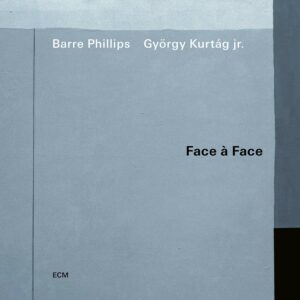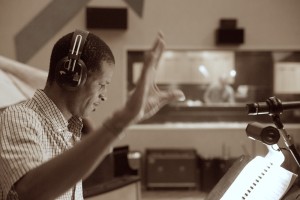Barre Phillips and György Kurtág Jr.
Face á Face
ECM Records
Luminary avant-jazz bassist Barre Phillips and György Kurtág Jr., son of the well-known Hungarian composer and an electronic musician, join together on Face á Face. Kurtág uses a variety of synths, providing both pitched material and percussion to complement Phillips’ bass-playing. It might not be a pairing one would have readily thought of, even with Phillips’ long pedigree of collaborations, but Face á Face is a compelling recording.
The album opener, “Beyond,” finds the two in a cat-and-mouse game, Kurtág beginning with oscillating seconds and then repeated pitches. Phillips responds initially with a melodic duet and then bends double stops. Chiming notes in the synths contrast Phillips’ low register melody on “The Under Zone.” “Two by Two” features sci-fi synths and combative percussion. Partway through, this gives way to Phillips, who plays repeated oscillations and harmonics in a hat tip to Kurtág’s textures. Low register double stops and minor seconds create a cavernous close. On “Across the Aisle,” both musicians play with material that combines non-pitched and pitched sounds, Phillips attacking various portions of his bass while Kurtág provides plinking gestures to offset bass harmonics. The piece begins and ends furiously with a more reserved development in between.
Every piece has a different sonic pedigree. Glissando bass lines and modular synth punctuations create intriguing blurring on the miniature “Algobench.” Double stopped bass notes and then repeated single tones are haloed by high register synth on “Chosen Spindle.” The synth part becomes more melodic and Phillips responds by taking on a grounding role with repeated octaves. Rather than concluding, the music seems to disappear. Arco playing and vibrating electronics, complete with cricket noises, are juxtaposed in the aptly named “Extended Circumstances.” “Bunch” has the players change roles, with Phillips making percussive sounds and Kurtág string-like glissandos. Phillips returns to harmonics, which are countered by a long, slow synthetic slide. On “Sharpen Your Eyes,” Phillips uses his bass as a drum and Kurtág engages in whistling noises. “Stand Alone” is a percussion duel with some bleeping to boot. The denouement is like a clock unwinding.
Phillips moves closer to jazz with a swinging line on “Ruptured Air.” Not taking the bait, Kurtág supplies angular, sustained single notes as an avant rejoinder. This blending of styles provides one of the more fascinating colloquies on Face á Face. The recording closes with “Forest Shouts,” a miniature in which Phillips plays double stops and repeated dissonant intervals. Kurtág responds with a droid-like flute tune to bring the proceedings to an enigmatic close. Ingenious music-making: Face á Face is one of our favorites of 2022.
-Christian Carey


